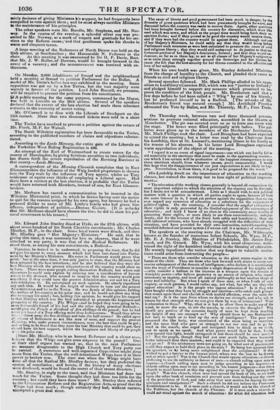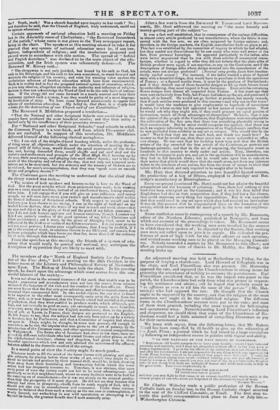Manchester. The pit was covered over so as to form
one room with
pen. Nevertheleaa, in these times, it is good to be prepared for the worst.'
but I desire not to be misunderstood. Little as I should wish to mix political throw away the five shillings and take the half.crown? He called upon law here to teach us to bind up the arm of intelligence? The poor man a!! daces of Reformers to act like men of sense, and support the present possessed the like body, was constituted of the saute being an ourneiven, A'..iiistiy, who, under present circumstances, were the best that could be got ; and the same God who gave us strength to use our am and to go for- god ,,r, long as he fouhd that they were the beet Ministry that could be got, they ward in the march, also urged and instigated him to think as we t!Mik, sleasld have his best support, whilst the happiness and liberty of the people and to speak as we speak. And what power would that he that, lit' ing sr•i e Ills polar star. once opened this light, would extinguish it lest there should be over intic!i of [Hoes Mr. Hindley, who is an honest Reformer and a clever man, it? But the people, though they had not over much light, were becoming holit.ve that the Whigs can give evert sixpence in the pound ? One better informed than their masters; and could it he expected that they would of their chief organs has warned us, that in the next Parliament loot go on ? If the aristocracy were not going on by what sort of preeminence am measure disagreeable to the High Church and Tory party can valid they expect to hold their place in the scale ? By being less ignorant than boo carried. A numerous and well-organized Oppcsition might force the ignorant, or by being more enlightened than the enlightened? If they wished to pet a barrie Inure from the Tories, than the well-intentioned Whigs have it in their barrier to the human m d, where was the line to be drawn, in and at what epoch? Was it the Church that would oppose education—a church power to bestow now. The time was when the Whigs might have professing to use its authority in favour of men—a church calling upon man to done all that the Radical Mr. Hindley desires; but they preferred the inquire—a church calling upon man to judge according to his inquiries7a aystean of conciliation ; and herein, if the history of many elections church calling upou man to act according to his honest judgment—was this a were disclosed, would be found the secret of their recent disasters.] church to stand forward at this day against the progress of light amino the Mr. Stanley. in reply to the toast, said that Ministers had done too people? Was this church, when man had opened the book of life, to set itrelf much for the Tories. Some thought they had done too little for the upon the other book of revelation and prevent man from finding out the views country ; but could they have done more ? Mr. Stanley then referred of the providence of God, and take away that new motive for fearing his um. to the Corporation Reform end the Registration Acts, as proof that the niscieuce and omnipotence?" Such a church he did not believe the Prote!.tant Whigs had done much ; though certainly they had, without success, Establishment to be. If it were such a church, it would not be the church of the Publican, but the church of the Pharisee. If it were such a clanch, it attempted g great deal more, could not stead %alma the raardh of eduoatiou i for what did education look far? Truth, truth! Was a church founded upon inquiry to fear truth ? No; and therefore he said that the Church of England, truly understood, could not be against education! Certain opponent/ of national education held a meeting on Friday last in the Assembly-room of Cheltenham ; "the Reverend Incumbent of the parish," whose name is not given in the Tory newspaper report, being in the chair. The speakers at this meeting seemed to take it for granted that any system of national education must be, if not irre- ligious, independent of religion ; and the resolutions proposed and passed were in accordance with this notion. The spread of "Infidel and Popish doctrines" was declared to be the main object of the edu- cationists, and the Irish system was vehemently denounced. The Reverend W. Kinsey said— The clergyman is not only justified, but bound by his oath to God, his oath to his Sovereign, and his oath to his own conscience, to stand forward and umintain the religion of his country, and raise his warning voice against the unchristian schemes of heathen education which have been recommended. Such is in reality and in fact the proposed national system of eaucation, which, as you may observe, altogether excludes the authority and influence of because it does not acknowledge the Word of God to be the only basis of manic- tion. If the clergy did not come forward in a manly manner and bear their testimony against such a system, I say they would be guilty of a most thsgraue- ful dereliction of duty. We have come forward unanimously to oppose this scheme of unchristian education. My belief is, that there is a deeply-laid scheme for the destruction of our Church and of our Constitution."
The Reverend S. Middleton proposed a resolution-
" That the National and other Scriptural Schools now establi•lied in this country have produced the most beneficial results; and that their utility is limited only by the insufficiency of their pecuniary resources."
For "National and other Scriptural Schools," rend schools in which the Common Prayer is a text-book, and from which Dissenters' chil-
dren are excluded. In support of this resolution, Mr. Middleton delivered himself of the following clerical metaphor-
" Sir, I am sick of the sleight-of-hand humbug which, under the profession of doing away all objections—which under the intention of meeting the de- prayed will of fallen man, would discard the penal enactments of the divine law, and, having discarded these, would shuffle and cut and deal out the statutes and ordinances and precepts of the Most High God, turning up by the way their own trump, and playing into each others' hands ; and is this the result of the liberality and reform of the day, that not only our temporal insti- tuthms are to be destroyed, but the armoury and the treasury of heaven are to be violated, for man's accommodation, that they may speak unto us smooth things and prophesy deceits?"' The Chairman gave the meeting to understand that the chief thing the clergy wanted was cash- " The motive of both speakers and hearers toolay is hive to the Word of God. lint the great mistake which these projectors' have inade, is in treating man as a mere moral machine, instead of an intellectual being, having eternity before him. I will engage that if you will give us your infliieure, and money enough, we will soon have every poor rustic's and manufacturer's child within the blessed influence of Scriptural schools. With respect to myself aud the kindcess you have shown to me teelay, I can in the sight of Goa awl on my heeded knees declare, that the desire of my soul is truth and truth alone—that my sun and object is the glory of God and the good of my fellow creatures; I hope I du not seek human applause and human sanction, though I cannot say that I am entirely careless of the good opinions of my fellow Christians and fellow parishioners; yet I trust, by the grace of Almighty God, never to be influenced by the frowns or smiles of my fellow-creatures. 1,1e-ire your prayers and not your praFes; I desire your supplications, that I may be enabled, if I am in the course of truth, to continue therein to my life's end, and remain firm in those principles which have borne me thus far, more than I: ilf the ordinary life of man, thruugh this wilderness."
From the speeches at this meeting, the friends of a system of edu- cation that would really be general and national, may anticipate the description of opposition they are likely to meet with.



























 Previous page
Previous page